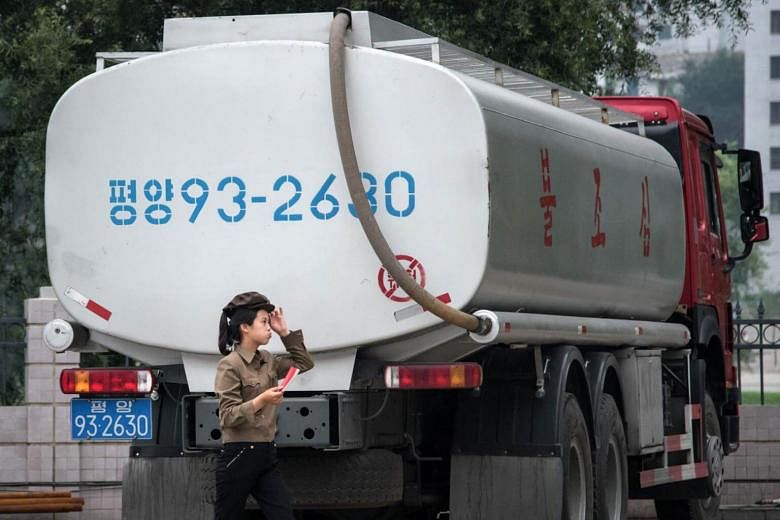SHENYANG (THE YOMIURI SHIMBUN/ASIA NEWS NETWORK) - North Korea has been pressing Chinese companies to increase their exports of gasoline and other refined petroleum products since August, according to North Korean government documents and other information obtained by The Yomiuri Shimbun.
A source with close knowledge of the Chinese-North Korean relationship said North Korean leader Kim Jong Un issued an order to stockpile gasoline and has restricted how much could be distributed on the market.
Both moves could have been in anticipation of the UN Security Council approving new sanctions. The council did approve new sanctions on Monday (Sept 11), making Mr Kim's concerns a reality.
The internal documents were drafted in August by the North Korean Ministry of External Economic Affairs, which has jurisdiction over foreign investment in North Korea.
The ministry also proposed creating a "fund collateral style" joint bank account between North Korea and China.
Out of consideration for Chinese concerns that North Korea might not make payments, North Korea would send payments to the account in advance, and China could withdraw the money when the cargo was delivered.
The documents also contain a plan to build a petroleum storage facility with a capacity of a dozen or so tonnes at a North Korean port.
A Chinese trader said that when a Pyongyang senior ministry official visited China in September, he pressured representatives of Chinese companies to cooperate, telling them the desire to secure a petroleum supply route "came from the top", meaning Mr Kim.
The Kim administration issued the gasoline stockpile order around April. The order was internally described as "in preparation for war". Currently, gasoline is preferentially distributed to the military, and its price has nearly doubled from the beginning of the year.
A notice was also issued in Pyongyang that private establishments can only use one vehicle each.
One reason North Korea started pressing Chinese companies last month to increase exports of gasoline and other refined petroleum products is because "Chinese authorities have been restricting petroleum exports since around April", a source with knowledge of the Chinese-North Korean relationship told The Yomiuri Shimbun.
The administration of Chinese President Xi Jinping may have been sending a warning to the Kim administration, which has been recklessly conducting nuclear weapon and missile programmes.
Some Chinese companies have refused to export products since around April. The reason given was "increased domestic demand".
In the Chinese city of Dandong on the North Korean border, oil drums were not able to pass through customs, and one trader was denied permission to export ink, being told "if it contains petroleum components, it could be used for military purposes".
Gasoline exports have decreased dramatically, hitting an all time monthly low of about 120 tonnes in July, according to Chinese customs statistics. In August, a ship attempting to smuggle 200 tonnes of gasoline near Dandong was discovered and seized by Chinese authorities.
China in effect began restricting exports in April, which is around the time Mr Xi first met with US President Donald Trump.
The Global Times, a publication affiliated with the Chinese Communist Party's organ People's Daily, has repeatedly published editorials since April 12 warning that should North Korea carry out a nuclear test, China would agree to a UN sanctions resolution, including restricting its petroleum supply.
The paper said it should not be a complete stop in supply, and also pointed out the range of conditions under which a humanitarian disaster would not occur in North Korea. While these editorials are not the official party view, they may reflect the views of its leadership.
Air China temporarily halted flights between Beijing and Pyongyang, citing a decrease in passengers. This was also said to have been ordered by the Chinese authorities. China wants "to show the United States that it is putting pressure on North Korea", a source said.
The Xi administration is under pressure from the United States, which warned it could place unilateral sanctions on Chinese companies that do business with North Korea.
Nevertheless, China continues to supply crude oil to North Korea from Dandong through an underground pipeline, thereby refraining from driving the Kim administration into a corner. As a result, North Korea's nuclear weapon and missile development projects and military provocations have simply continued.
"China's way of dealing out pressure little by little is becoming less and less viable," a source said.

